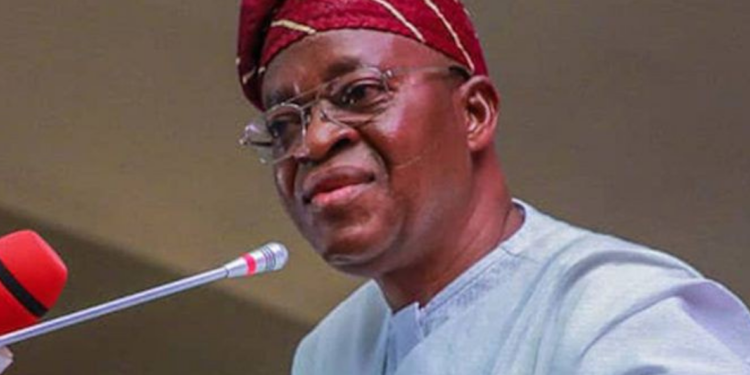The Federal Government has announced plans to elevate Nigeria’s maritime sector to global prominence by accelerating its development, increasing its GDP contribution, and harnessing its potential for the benefit of current and future generations. Minister of Marine and Blue Economy, Adegboyega Oyetola, revealed this during a stakeholders’ workshop on the National Policy on Marine and Blue Economy held in Lagos.
According to Oyetola, Nigeria has made significant strides in maritime governance, including ratifying and domesticating international protocols and conventions. These efforts have enhanced the country’s safety and security framework, leading to an impressive three-year period without any incidents of piracy in Nigerian waters.
The Minister announced that the Ministry is finalizing a comprehensive policy addressing critical areas aligned with the goals of President Bola Tinubu’s administration to strengthen the national economy through maritime and blue economy initiatives. Oyetola said, “A robust national policy will ensure that we address these issues through a comprehensive framework that aligns with international best practices while safeguarding our marine resources for future generations.”
The new policy, according to Oyetola, aims to provide a blueprint for effective management and coordination among relevant Ministries, Departments, and Agencies (MDAs) and stakeholders within the value chain for harmonizing national actions in the maritime sector.
Oyetola emphasized that the blue economy “is a transformative pathway for nations seeking to balance economic growth with environmental sustainability. For Nigeria, with over 853 kilometres of coastline, extensive inland waterways, and a vast exclusive economic zone, the marine environment holds unparalleled opportunities.”
These opportunities, the Minister said, “range from fisheries and aquaculture to shipping, tourism, and renewable energy. However, these opportunities come with challenges: unsustainable practices, environmental degradation, and illegal activities, such as Illegal, Unreported, and Unregulated (IUU) fishing.”
The validation workshop, Oyetola said, “is a milestone in our efforts to elevate Nigeria’s marine and blue economy. It is a product of diligent and inclusive policymaking that underscores our ministry’s commitment to collaboration and precision.”
The Minister also addressed the recurring spate of boat mishaps, saying, “this policy seeks to implement comprehensive strategies to ensure the safety of all waterways. However, challenges such as the spate of boat mishaps demand urgent attention, and this policy aims to establish comprehensive measures to enhance safety across our waterways.”
Oyetola emphasized that the government is committed to repositioning Nigeria as a dominant player in the marine and blue economy both regionally and globally. He added that the government is actively seeking private sector investment for port modernization, which is critical for boosting Nigeria’s competitiveness and attracting sustainable funding for the sector.
The Permanent Secretary in the Ministry, Olufemi Oloruntola, said the validation workshop is a key step in shaping the National Policy on Marine and Blue Economy. He added that the discussions at the workshop “will ensure that the final document reflects practical solutions and innovative strategies, paving the way for a marine and blue economy that supports economic growth, job creation, and environmental sustainability.”


































